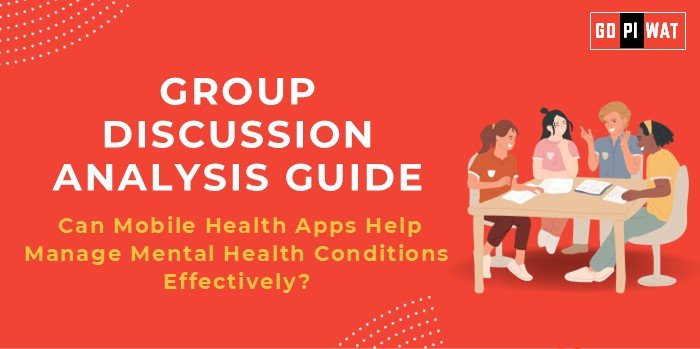📋 Group Discussion Analysis Guide: Can Mobile Health Apps Help Manage Mental Health Conditions Effectively?
🌐 Introduction to the Topic
📖 Opening Context
“With the global mental health crisis reaching unprecedented levels, mobile health apps offer a new frontier in mental health management, combining accessibility with technological innovation.”
📜 Background
The emergence of mental health apps stems from the broader adoption of telemedicine, accelerated by the COVID-19 pandemic. Apps like Calm, Headspace, and Talkspace are widely recognized for providing scalable solutions for therapy, mindfulness, and stress management.
📊 Quick Facts and Key Statistics
- 🌍 Global Market Size: Mental health app market estimated at $4.2 billion in 2023, with a CAGR of 17.1% projected till 2030.
- 📈 Adoption Rates: 64% of users in a 2023 survey reported improved mental well-being via apps.
- 📱 Accessibility: Over 90% of smartphone users worldwide can access at least one mental health app.
- 🚀 Usage Spike: Downloads of mental health apps surged by 30% during COVID-19 (Source: App Annie).
- 📊 Clinical Validation: 25% of apps demonstrate scientific efficacy (APA report, 2022).
🤝 Stakeholders and Their Roles
- 💻 Developers: Innovate features using AI/ML for personalized care.
- 🏥 Healthcare Providers: Integrate apps into treatment plans for continuity.
- 🏛️ Governments: Ensure app regulation, privacy, and accessibility.
- 👥 Users: Adopt apps as part of self-care routines.
- 💰 Insurers: Cover app-based therapies for affordability.
🏆 Achievements and Challenges
✨ Achievements
- 📱 Accessibility: Apps bridge the gap for underserved populations, providing tools in remote or rural areas.
- 💰 Affordability: Many apps offer free or low-cost services, reducing barriers to entry.
- 📈 Scalability: Apps can serve millions simultaneously without strain on physical healthcare infrastructure.
- 🎮 Engagement: Features like gamification and real-time feedback increase adherence.
⚠️ Challenges
- 📉 Efficacy Concerns: Many apps lack clinical validation, risking unreliable outcomes.
- 🔒 Data Privacy: Apps collect sensitive information, posing risks of misuse or breaches.
- 🌐 Digital Divide: Users in low-income regions may lack smartphones or internet access.
🌎 Global Comparisons
- 🇦🇺 Success Story: Australia’s “MyCompass” app, validated by clinical trials, offers tailored modules for anxiety and depression.
- 🌍 Challenges in Developing Nations: Limited app adoption due to infrastructural gaps.
📖 Case Study
📜 India’s Ayushman Bharat Digital Health Mission: Incorporates digital mental health tools, boosting access for over 150 million beneficiaries.
💡 Structured Arguments for Discussion
- 👍 Supporting Stance: “Mobile health apps are revolutionizing mental health care, providing cost-effective and accessible solutions for millions worldwide.”
- 👎 Opposing Stance: “The lack of clinical validation and potential privacy breaches make mental health apps unreliable as primary care tools.”
- ⚖️ Balanced Perspective: “While apps enhance accessibility, addressing efficacy and privacy concerns is crucial for sustainable mental health management.”
📈 Effective Discussion Approaches
🔑 Opening Approaches
- 📊 Statistics: “With a 64% reported improvement among users, mobile health apps represent a transformative shift in mental health management.”
- ✨ Contrast: “While apps offer affordability, their reliance on unregulated data collection raises ethical questions.”
- 📖 Case Study: “India’s adoption of digital health tools under Ayushman Bharat highlights both opportunities and gaps in leveraging mobile apps.”
🤔 Counter-Argument Handling
- 💡 “While efficacy concerns are valid, introducing standardized validation protocols can enhance app reliability.”
- 🔒 “Privacy concerns can be mitigated by stronger encryption standards and transparent policies.”
🔍 Strategic Analysis of Strengths and Weaknesses
- 🌟 Strengths: Accessibility across demographics; cost-effectiveness; ease of use.
- ⚠️ Weaknesses: Dependence on technology; risk of misdiagnosis or over-reliance.
- 🚀 Opportunities: AI-driven customization; partnerships with healthcare systems.
- ⚡ Threats: Data misuse scandals; regulatory crackdowns.
📚 Connecting with B-School Applications
- 🌐 Real-World Applications:
- 📱 Leveraging mental health apps for healthcare strategy projects or innovation labs.
- 🤝 Exploring partnerships with tech companies for health-focused initiatives.
- 💬 Sample Interview Questions:
- 🧠 “What role do mental health apps play in achieving healthcare accessibility?”
- 📜 “How can businesses ensure ethical app development for mental health?”
- 💡 Insights for B-School Students:
- 📊 Explore mental health apps’ impact on workforce productivity.
- 📈 Study their integration into employee wellness programs.


